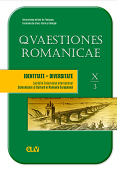Les relations internationales entre août et septembre 1939, reflétées dans les pages du journal banatien L'Ouest
International relations between August and September 1939, reflected in the pages of the Banat newspaper
Author(s): Eusebiu NaraiSubject(s): Media studies, International relations/trade, WW II and following years (1940 - 1949)
Published by: Universitatea de Vest din Timişoara
Keywords: "Polish corridor"; World War II; Sever Bocu; "The West"; Timișoara;
Summary/Abstract: The year 1939 began with shocking news for all those who believed in the values of democracy and in maintaining the territorial status quo established at the end of World War I: on January 2, the American magazine Time named Adolf Hitler as "Man of the Year". It should not be forgotten that 1938 marked the "triumph" of Franco-British conciliation, which had reacted "pale" to the March Anschluss and preferred to resolve the Sudeten crisis by ceding this overwhelmingly inhabited area by the Germans. Located in southern Czechoslovakia, to the Third Reich, following a conference in Munich with Germany and Italy, along with France and England, in September. Poland and Hungary also contributed to the dissolution of the Czechoslovak state, taking over, under pressure (Hungary), with obvious Italian-German support, and the ultimatum (Poland), important regions of the Czechoslovak Republic: Tešin and Friestadt – to Poland and, respectively, Ruthenia (Ukraine) Subcarpathian – to Hungary. The signing of the Ribbentrop-Molotov Pact on August 23, 1939, was a prelude to World War II. «The West» newspaper presented, commented on and disseminated information on the evolution of international relations after the disappearance of the Czechoslovak state from the map of Europe, from credible sources, the analyzes of its reputable editors proving extremely relevant and objective. Not even the change of the profile of the mentioned newspaper determined the renunciation of the excellent foreign policy column, emblematic for this publication. The main events were Bulgarian revisionism, the Danzig crisis, the military maneuvers carried out by Germany and Italy, Hungarian revenge, the debates in the British Parliament on the imminence of a devastating new war, the internal reconciliation in Yugoslavia amid deteriorating international political climate, the ministerial dialogue between the prime minister the French (Daladier) and the German Chancellor (Hitler), the astonishment of the Japanese ruling circles towards the signing of the Ribbentrop-Molotov Pact (August 23, 1939), which marked the division of spheres of influence in Europe between the Third Reich and the Soviet Union and was preparing for the outbreak of the Second World War.
Journal: Quaestiones Romanicae
- Issue Year: X/2023
- Issue No: 3
- Page Range: 40-56
- Page Count: 17
- Language: French

